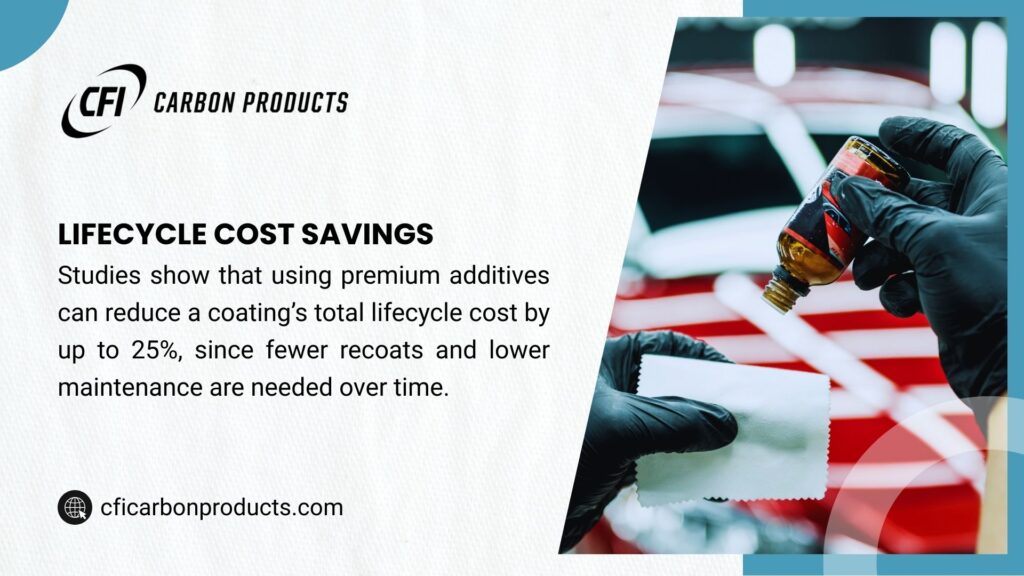Paint and coating companies need reliable partners to create high-performance products that meet market demands. The right coating additives manufacturer can turn ordinary formulations into premium products that stand out from competitors.
The best manufacturers do more than just supply materials. They bring technical expertise, deliver consistent quality, and provide smart solutions that help formulators create better coatings and cut production costs, too.
What Makes a Quality Coating Additives Manufacturer
A professional coating additives manufacturer combines advanced production capabilities with deep technical knowledge. These companies understand how different additives affect coating performance and can guide customers toward optimal solutions.
Quality manufacturers maintain strict quality control systems and offer comprehensive technical support. They help R&D teams develop new formulations and assist procurement managers in cost-effective sourcing strategies.
Manufacturer Quality Factor | Impact on Customer | Business Benefit |
Technical Expertise | Better formulation support | 20-30% faster development |
Quality Consistency | Reliable production | 15-25% fewer defects |
Supply Chain Reliability | Reduced downtime | 25-35% better efficiency |
Types of Coating Additives and Applications
Different coating applications require specific additive types from specialized manufacturers. Each category serves particular functions in coating formulations.
- Carbon Black for Coatings
Carbon black for coatings provides color, UV protection, and conductivity enhancement. Leading manufacturers offer various grades optimized for different coating types.
CFI Carbon Products specializes in Austin Black 325, an organic alternative that delivers superior performance in coating applications. This eco-friendly option reduces environmental impact compared to traditional carbon black products.
Carbon Black Grade | Primary Function | Coating Application |
High Structure | UV protection | Exterior architectural |
Medium Structure | Color development | Industrial coatings |
Low Structure | Cost effectiveness | Primer formulations |
- Plastic Additives for Coating Systems
Modern coating formulations often incorporate plastic additives to enhance film properties. These additives improve flexibility, adhesion, and durability.
Plastic filler material in coatings reduces costs and improves application properties. Plastic reinforcement additives strengthen coating films and extend service life.
- UV Additives for Paint Applications
UV additives for paint protect coating films from photodegradation. These additives absorb harmful radiation and prevent color fading and film breakdown.
Professional coating additives manufacturers offer complete UV stabilizer systems. These formulations combine different mechanisms for maximum protection in demanding outdoor applications.

Key Benefits of Working with Professional Manufacturers
Established coating additives manufacturers provide measurable advantages across all aspects of coating development and production. These benefits translate directly to improved profitability.
Benefit Category | Typical Improvement | Implementation Time |
Formulation Speed | 30-50% faster development | 2-4 months |
Cost Reduction | 15-25% material savings | 1-3 months |
Quality Consistency | 40-60% fewer batch failures | 3-6 months |
- Technical Support Advantages
Professional manufacturers provide comprehensive technical support that goes beyond basic product supply. Their experts help solve formulation challenges and optimize coating performance.
This support includes laboratory testing, formula optimization, and troubleshooting assistance. Technical teams understand what industrial additives are and how they interact in complex coating systems.
- Supply Chain Reliability
Reliable coating additives manufacturers maintain consistent supply chains that prevent production disruptions. They offer multiple sourcing options and maintain strategic inventory levels.
Consistent delivery schedules help coating manufacturers maintain production efficiency. Reliable suppliers reduce inventory carrying costs and improve cash flow management.
Industrial Applications Across Coating Sectors
Professional coating additives manufacturers serve diverse market segments with specific performance requirements and regulatory standards.
- Architectural Coating Applications
Architectural coatings require additives that provide weather resistance, color retention, and easy application properties. Paint additive for cabinets demands different characteristics than exterior wall coatings.
What specialty additives become critical in premium architectural applications? These formulations require precise additive combinations to achieve superior performance.
Coating Type | Primary Additives | Performance Focus |
Exterior Paint | UV stabilizers, pigments | Weather resistance |
Interior Paint | Flow aids, anti-foaming | Application properties |
Wood Coatings | Additives for wood coatings | Penetration and protection |
- Industrial Coating Applications
Industrial coatings face extreme service conditions requiring specialized additive formulations. These applications include automotive, marine, and equipment coatings.
Coating additives manufacturers develop products for specific industrial requirements. High-temperature resistance, chemical compatibility, and corrosion protection drive additive selection.
- Automotive Coating Systems
Automotive coatings require additives that provide excellent appearance, durability, and environmental resistance. These systems use multiple coating layers with specific additive requirements.
Professional manufacturers understand automotive specification requirements and provide certified additives. Quality systems ensure consistent performance across production volumes.
Selection Criteria for Coating Additives Manufacturers
Choosing appropriate coating additives manufacturers requires the evaluation of multiple technical and business factors. Wrong selections lead to formulation problems and supply disruptions.
Selection Factor | Importance Level | Key Evaluation Points |
Technical Capability | Critical | R&D support and expertise |
Quality Systems | Critical | Certification and consistency |
Supply Reliability | High | Delivery performance history |
- Technical Capability Assessment
Evaluate the manufacturer’s technical capabilities through their R&D facilities, testing equipment, and staff expertise. Strong technical teams provide better formulation support and problem-solving assistance.
Review their understanding of polymer additives and how different additives interact in coating systems. Technical depth determines their ability to support complex formulation challenges.
- Quality System Evaluation
Professional coating additives manufacturers maintain comprehensive quality systems that ensure consistent product performance. These systems include raw material testing, process control, and finished product verification.
ISO certifications and industry-specific approvals demonstrate commitment to quality excellence. Regular audits confirm ongoing compliance with quality standards.
- Supply Chain Reliability
Assess manufacturer supply chain capabilities, including production capacity, inventory management, and logistics capabilities. Reliable suppliers prevent costly production disruptions.
Geographic proximity to manufacturing facilities can reduce transportation costs and delivery times. Multiple production locations provide supply security and risk mitigation.
Manufacturing Processes and Quality Control
Leading coating additives manufacturers employ advanced production processes that ensure consistent product quality and performance. These processes determine final product characteristics.
- Production Technology
Modern manufacturing facilities use automated systems that provide precise control over product specifications. Advanced equipment ensures consistent particle size distribution and chemical composition.
Is carbon conductive becoming important in specialty coating applications? Manufacturing processes must maintain electrical properties while ensuring other performance characteristics.
Process Control Area | Quality Impact | Monitoring Method |
Particle Size | Coating appearance | Laser diffraction analysis |
Chemical Purity | Performance consistency | Spectroscopic analysis |
Moisture Content | Storage stability | Gravimetric analysis |
- Quality Control Systems
Comprehensive quality control systems test raw materials, monitor production processes, and verify finished product specifications. These systems prevent quality issues before products reach customers.
Statistical process control identifies trends and enables proactive adjustments. Continuous monitoring ensures products meet customer specifications consistently.
- Certification and Compliance
Professional manufacturers maintain certifications required for coating applications, including food contact, architectural, and industrial specifications. These certifications enable market access and customer approval.
Carbon black structure and carbon black density must meet specific standards for different coating applications. Certified manufacturers provide documentation supporting these requirements.
Sustainability and Environmental Considerations
Modern coating additives manufacturers prioritize environmental responsibility through sustainable production methods and eco-friendly product development. These initiatives support customer sustainability goals.
Sustainability Initiative | Environmental Benefit | Business Impact |
Low-Emission Production | Reduced carbon footprint | 20-30% energy savings |
Renewable Raw Materials | Resource conservation | Cost stability |
Waste Minimization | Less environmental impact | 15-25% waste reduction |
- Eco-Friendly Manufacturing
CFI Carbon Products demonstrates sustainable manufacturing through low-emission production processes. Austin Black 325 shows how sustainable carbon alternatives can meet performance requirements.
Reduced energy consumption and waste generation create competitive advantages. Sustainable practices appeal to environmentally conscious customers and support regulatory compliance.
- Product Innovation
Leading manufacturers invest in research and development of sustainable additive alternatives. Bio-based additives reduce dependence on petroleum-derived raw materials.
These innovations maintain performance standards and meet regulatory requirements. Market acceptance grows as sustainable alternatives match traditional product performance.
Cost Analysis and Value Proposition
Working with professional coating additives manufacturers provides economic benefits beyond basic product pricing. Total value includes technical support, quality consistency, and supply reliability.
- Total Cost of Ownership
Comprehensive cost analysis includes material costs, technical support value, quality consistency benefits, and supply reliability advantages. Premium manufacturers often provide superior total value.
Cost Component | Impact on Total Cost | Value Consideration |
Material Price | Direct cost impact | Quality justifies a premium |
Technical Support | Reduced development cost | Faster time to market |
Quality Consistency | Lower rejection rates | Improved profitability |
Future Trends in Coating Additives Manufacturing
The coating additives industry continues to evolve, driven by environmental regulations, performance requirements, and cost pressures. Leading manufacturers adapt to these changing demands.
- Smart Additive Systems
Next-generation additives respond to environmental conditions and optimize coating performance automatically. These systems improve coating durability and reduce maintenance requirements.
Advanced formulations adjust properties based on temperature, humidity, and UV exposure. Smart additives represent the future of high-performance coating systems.
- Sustainable Innovation
Renewable additive sources and biodegradable formulations address environmental concerns. Bio-based alternatives replace petroleum-derived compounds in many applications.
What carbon black does in sustainable formulations differs from traditional applications. New approaches balance performance with environmental responsibility.
Technical Support and Customer Service
Professional coating additives manufacturers provide comprehensive technical support that extends throughout the customer relationship. This support differentiates premium suppliers from commodity providers.
Support Service | Customer Benefit | Business Impact |
Formulation Assistance | Faster development | Reduced R&D costs |
Application Testing | Performance validation | Lower risk launches |
Troubleshooting Support | Quick problem resolution | Minimized downtime |
- Laboratory Services
Advanced manufacturers operate fully equipped laboratories that support customer formulation development. These facilities provide testing services and performance validation.
Analytical capabilities include particle characterization, thermal analysis, and performance testing. Laboratory support accelerates product development and reduces customer investment requirements.
- Training and Education
Technical training programs help customer teams understand additive technology and optimize formulation practices. Educational support improves customer success rates.
Regular seminars and technical publications share industry knowledge and best practices. Educated customers achieve better results and develop stronger supplier relationships.

How to Choose the Right Coating Additives Manufacturer
Selecting appropriate coating additives manufacturers requires a systematic evaluation of technical capabilities, quality systems, and business factors. Proper selection ensures long-term success.
Professional manufacturers like CFI Carbon Products combine technical expertise with reliable supply chain capabilities. Their Austin Black 325 demonstrates innovation in sustainable additive technology.
Success depends on thorough supplier evaluation, clear performance requirements, and ongoing relationship management. Investment in quality manufacturers generates measurable returns through improved formulations and reduced costs.
Modern coating development cannot achieve optimal results without professional additive suppliers. These partnerships bridge the gap between basic formulations and high-performance coating systems that meet demanding market requirements.
Contact CFI Carbon Products today to explore how our advanced coating additives can enhance your formulation capabilities and product performance. Our technical team provides expert guidance tailored to your specific coating applications and performance objectives.

